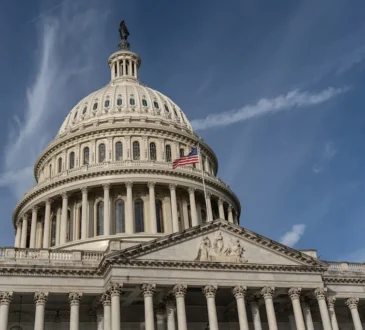
Any guess why luxury home sales in San Francisco are up 14 percent year-over-year lately?
Or why the high-end more than tripled the 4.2 percent year-over-year increase in overall sales in the city this summer?
Put it on AI’s tab.
With artificial intelligence exploding in the Bay Area, it’s more than just offices and apartments that are being gobbled up by companies and employees. In fact, just like apartments, there’s seemingly not enough mansions to go around for everyone.
The San Francisco real estate market is going through a mansion shortage, as AI barons and other well-paid executives and workers move into town and search for high-end digs to call home. As AI startups scale, luxury listings that previously sat unclaimed for months are now getting multiple offers within days of hitting the market.
“The city is just flush with cash right now — and there’s not enough inventory to keep up with it,” luxury broker Peter Rodway, senior partner at Neal Ward Properties, told the San Francisco Chronicle. Gregg Lynn, a luxury agent with Sotheby’s International Realty, said “the future wealth in AI” is currently touring homes in San Francisco, whether they be $2 million condos or $20 million houses. “That wealth effect is going to continue to help drive demand,” Lynn said.
The mansion shortage is the latest evidence of the growing AI sector’s effects on real estate throughout the city, whether residential or commercial. VTS predicts office leasing from AI firms will accelerate in the coming months as demand from the sector has more than doubled in the past year. The city saw a 107 percent year-over-year increase in office demand as of last month, marking a more than 350 percent jump since OpenAI’s ChatGPT was first released to the public in 2022.
In total, AI is expected to bring between 50,000 and 60,000 tech workers to San Francisco by 2030, according to experts at CBRE. At the same time, the office footprint of these firms could balloon in that same period from around 5 million square feet to 21 million square feet by decade’s end.
Lenders seize more SF offices…
Want a silver lining? The increasing willingness of lenders to take back buildings rather than play along with borrowers looking to “extend and pretend” could be taken as a sign of some fundamental faith in the Bay Area office market.
Lately the trend has visited the owners of the 1019 Market Street building, which fell into default in August. Lenders took control of the building last week in a foreclosure bid.
The building, once home to the headquarters of Zendesk, went for $10.3 million — a steep tumble from its appraised pre-pandemic value of $71.4 million. The previous owner was 1019 Market Street LP, reported to be an affiliate of Deutsche Bank asset management arm DWS.
Other office buildings nearby have similarly faced foreclosure in recent months.
In August, a lender named JPMBB 2014-C22 Jackson Street LLC, listed in state records with an address at Starwood Capital Group’s Miami office, took over the 244 Jackson Street building following a foreclosure auction.
That same month, lenders sued Kylli to place the office building at 225 Bush Street into receivership after the company defaulted on a $350 million loan backed by the property last November. In March, lender Deutsche Bank looked to sell that distressed building.
…and other lenders look to do the same in San Jose
The unraveling of Z&L Properties’ Bay Area real estate empire has prompted lenders to take action.
A lending group linked to real estate executives William Wang and Chris Jiashu Xu is pursuing foreclosure on the abandoned Greyhound bus station in downtown San Jose, the centerpiece of a monthslong fight over the Chinese developer’s debt obligations. A Z&L affiliate previously filed for bankruptcy in July to fight off any foreclosure threat.
That doesn’t seem to have done much. Now, a federal judge is trying to allow the lenders to proceed with a foreclosure seizure after handing down a ruling that would scuttle that bankruptcy case. But Z&L quickly fought back by suing to block the foreclosure, claiming the lender lured them with a bait-and-switch when it came to securing a debt workout deal last year with a higher-interest loan it called “a foreclosure trap.”
Like other projects in downtown San Jose, Z&L had big plans for the Greyhound site but never followed through with its redevelopment. Z&L agreed to renovate an old church and build housing towers on the site, though the firm neglected it and the housing development fell apart, as did a proposed housing development on Terraine Street.
Distressed office buildings need buyers
In the latest sign of the office market’s slow-but-steady recovery in other parts of the Bay Area, the two-building Concord Tech Center in Concord is on the market.
After lender Wells Fargo moved to pursue judicial foreclosure on the property following Partners Group’s default on a $400 million loan backed in part by the East Bay office campus, court-appointed receiver Stapleton Group is now on the hunt for a buyer.
San Francisco’s One Market Plaza could be headed for a similar fate, as an $850 million loan tied to the building is nearing maturity and owners Paramount Group and Blackstone have yet to indicate what they’re going to do. The duo have already paid down a loan backed by the complex from $975 million to $850 million in order to secure an extension of the loan’s maturity from February 2024 to February 2026; an extension option included a forbearance that would push maturity to February 2028.
Alameda neighborhood poised to go hungry
Bay Farm Island is in danger of losing its only grocery store, leaving residents in a food desert in the middle of San Francisco Bay.
The True Life Companies has filed plans to build more than 300 homes on the site of the Harbor Bay Landing shopping center, anchored by a Safeway, the only grocery store on Bay Farm Island. Harbor Bay was identified by city officials as an ideal site to build new housing in order to meet state-mandated housing goals.
True Life plans to demolish the existing 130,000 square feet of commercial space to clear the way for 305 new homes. Of those, 88 would be rental apartments and 217 would be for-sale townhomes; 55 of the units would be designated for affordable housing.
Read more

Major tech space given over to collaboration over competition on AI

AI companies driving SF office demand as firms gobble up millions of square feet

Merger brings East Bay expert Nadine Whisnant to Maven Commercial




